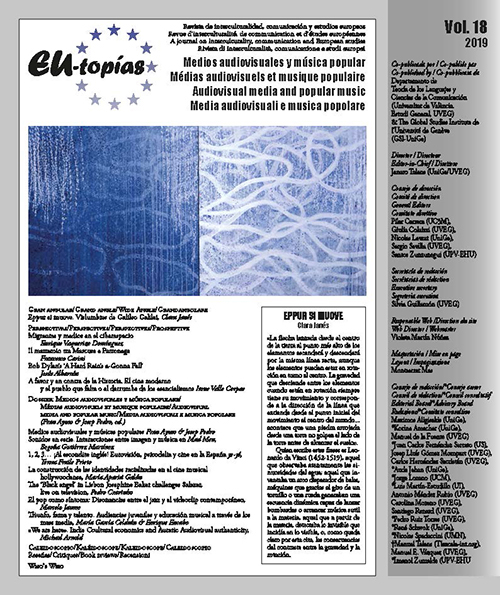For and Against History. Modern cinema and the missing people or the collapse of essentialism
DOI:
https://doi.org/10.7203/eutopias.18.16841Keywords:
New Waves, memory, sixties, Jean-Luc Godard, Pier Paolo Pasolini Abstract
Abstract
The freshness of the new waves actually began as a breath of memory and History. For a generation of filmmakers in the sixties, the irruption of Modernity should not mean forgetfulness, the cult of the ephemeral or the delocalised. On the contrary, working with the remains of the IIGM and in a climate of strong geopolitical tension and major social changes, especially in Europe, such filmmakers, distrusting, did not want to forget past or present wounds, they re-opened them against the amnesic consensus inherent of the days of “progress”. They set out to criticize the great ideals that began to wither on the horizon of the great social transformations of the post-war period and pleaded for the creation of new ones through the use of images.
 Downloads
Downloads
 References
References
Aidelman, Núria y De Lucas, Gonzalo (ed.) (2010), Pensar entre imágenes. Conversaciones, entrevistas, presentaciones y otros fragmentos, Barcelona: Intermedio.
Baldwin, James (1963), The Fire Next Time, Nueva York: Penguin Books.
Baudrillard, Jean (1970), El sistema de los objetos, México: Siglo XXI.
Bell, Daniel (1992), El fin de las ideologías. Sobre el agotamiento de las ideas políticas en los años cincuenta, Madrid: Ministerio de Trabajo y Seguridad Social.
Deleuze, Gilles (2015), La imagen-tiempo. Estudios sobre cine 2, Barcelona: Paidós.
Deleuze, Gilles y Guattari, Felix (1993), ¿Qué es la filosofía?, Barcelona: Anagrama.
Font, Domènec (2002), Paisajes de la modernidad. Cine europeo, 1960-1980, Barcelona: Paidós.
Foster, Hal (1985), «The “Primitive” Unconscious of Modern Art», October, 34, págs. 45-70.
Huyssen, Andreas (2006), Después de la gran división. Modernismo, cultura de masas, posmodernismo, Buenos Aires: Ana Hidalgo.
Lefebvre, Henri (1968), El derecho a la ciudad, Barcelona: Ediciones 62.
Marcuse, Herbert (1953), El hombre unidimensional. Ensayo sobre la ideología de la sociedad industrial avanzada, Barcelona: Planeta Agostini.
Núñez Laiseca, Mónica (2006), Arte y política en la España del desarrollismo, Madrid: Consejo Superior de Investigaciones Científicas.
Pasolini, Pier Paolo (1997), La religión de mi tiempo, Barcelona: Icaria.
Ross, Kristin (2008), Mayo del 68 y sus vidas posteriores. Ensayo contra la despolitización de la memoria, Madrid: Antonio Machado Libros.
Valle Corpas, Irene y Arozamena, Alejandro (2018), «Leer/ver dos veces hasta olvidar: elementos alegóricos y falso documental en Hiroshima mon amour», Hugo López Castrillo y Pedro José Mariblanca (ed.), Olvidar/Forgetting- Brumaria Works #9, Madrid: Brumaria, págs. 671-693.
Downloads
Published
How to Cite
-
Abstract435
-
PDF (Español)242
Issue
Section
License
![]()
The authors conserve the copyright. All content published in EU-topías. Journal of interculturality, Communication, and European Studies are subject to the license Creative Commons Attribution-NonCommercial-ShareAlike 4.0 license. The full text of the license can be found at <http://creativecommons.org/licenses/by-nc-sa/4.0>
They may be copied, used, disseminated, transmitted and publicly displayed, provided that:
- The authorship and original source of the publication is cited (journal, publisher and URL of the work).
- They are not used for commercial purposes.
- The existence and specifications of this license of use are mentioned.
It is the responsibility of the authors to obtain the necessary permissions for images that are subject to copyright.



